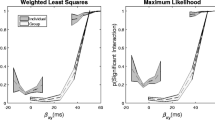Abstract
Two experiments investigated 1st-, 3rd-, and 5th-grade children’s and adults’ judgments related to the controllability of cognitive activities, including object recognition, inferential reasoning, counting, and pretending. In Experiment 1, fifth-grade children and adults rated transitive inference and interpretation of ambiguous pictures as more effortful than object recognition or deduction by elimination, and first-grade children rated transitive inference as more effortful than deduction by elimination. In Experiment 2, third- and fifth-grade children rated it more difficult to arrive at alternative outcomes for object recognition than for pretending, and adults distinguished object recognition and deduction from pretending and interpreting ambiguous pictures. From first-grade to adulthood there were increases in the number of distinctions made among cognitive activities in terms of level of controllability.
Similar content being viewed by others
References
Brown, A. L., Smiley, S. S., Day, J. D., Townsend, M. A. R., & Lawton, S. C. (1977). Intrusion of a thematic idea in children’s comprehension and retention of stories. Child Development, 48, 1454–1466.
Carpendale, J. I., & Chandler, M. J. (1996). On the distinction between false belief understanding and subscribing to an interpretative theory of mind. Child Development, 67, 1686–1706.
Efklides, A., Samara, A., & Petropolou, M. (1999). Feeling of difficulty: an aspect of monitoring that influences control. European Journal of Psychology of Education, 14, 461–476.
Fabricius, W. V., Schwanenflugel, P. J., Kyllonen, P. C., Barclay, C. R., & Denton, S. M. (1989). Developing theories of the mind: children’s and adults’ concepts of mental activities. Child Development, 60, 1278–1290.
Flavell, J. H. (1981). Cognitive monitoring. In W. P. Dickson (Ed.), Children’s oral communication skills (pp. 35–60). New York: Academic.
Flavell, J. H., & Green, F. L. (1999). Development of intuitions about the controllability of different mental states. Cognitive Development, 14, 133–146. doi:10.1016/S0885-2014(99)80021-5.
Flavell, J. H., Green, F. L., & Flavell, E. R. (1998). The mind has a mind of its own: developing knowledge about mental uncontrollability. Cognitive Development, 13, 127–138. doi:10.1016/S0885-2014(98)90024-7.
Hasher, L., & Zacks, R. T. (1979). Automatic and effortful processes in memory. Journal of Experimental Psychology: General, 108, 356–388. doi:10.1037/0096-3445.108.3.356.
Humphrey, N. (1986). The inner eye. London: Faber and Faber.
Kobasigawa, A., & Metcalfe-Haggert, A. (1993). Spontaneous allocation of study time by first- and third-grade children in a simple memory task. The Journal of Genetic Psychology, 154, 223–235.
Koriat, A. (1998). Illusions of knowing: The link between knowledge and metaknowledge. In V. Y. Yzerbet, G. Lories, & B. Dardenne (Eds.), Metacognition: Cognitive and social dimensions (pp. 16–34). London: Sage Publications.
Kun, A. (1977). Development of the magnitude-covariation and compensation schemata in ability and effort attributions of performance. Child Development, 48, 862–873.
Lovett, S. B., & Pillow, B. H. (1996). The development of the ability to distinguish between comprehension and memory: evidence from goal-state evaluation tasks. Journal of Educational Psychology, 88, 546–562.
Lyons, K. E., & Ghetti, S. (2011). The development of uncertainty monitoring in early childhood. Child Development, 82, 1778–1787. doi:10.1111/j.1467-8624.2011.01649.
Mandler, G. (2002). Consciousness recovered: Psychological functions and origins of consciousness. Amsterdam: John Benjamins Publishing Company.
Nelson, T. O. (1996). Consciousness and metacognition. American Psychologist, 51, 102–116. doi:10.1037/0003-066X.51.2.102.
Nelson, T. O., & Narens, L. (1994). Why investigate metacognition? In J. Metcalfe & A. Shimamura (Eds.), Metacognition: Knowing about knowing (pp. 1–25). Cambridge: Bradford Books.
Nicholls, J. G., & Miller, A. T. (1984). Reasoning about the ability of self and others: a developmental study. Child Development, 55, 1990–1999.
Parault, S. J., & Schwanenflugel, P. J. (2000). The development of conceptual categories of attention during the elementary school years. Journal of Experimental Psychology, 75, 245–262.
Pillow, B. H. (2002). Children’s and adults’ evaluation of the certainty of deductive inferences, inductive inferences, and guesses. Child Development, 73, 779–792. doi:10.1111/1467-8624.00438.
Pillow, B. H. (2012). Children’s discovery of the active mind: Phenomenological awareness, social experience, and knowledge about cognition. New York: Springer Publishers.
Pillow, B. H., & Anderson, K. L. (2006). Children’s awareness of their own certainty and understanding of deduction and guessing. British Journal of Developmental Psychology, 24, 823–849. doi:10.1348/026151005X83360.
Pillow, B. H., & Pearson, R. M. (2009). Children’s and adults’ evaluation of their own inductive inferences, deductive inferences, and guesses. Merrill-Palmer Quarterly, 55, 135–156. doi:10.1353/mpq.0.0018.
Pillow, B. H., Pearson, R. M., Hecht, M., & Bremer, A. (2010). Children’s and adults’ judgments of the certainty of deductive inferences, inductive inferences, and guesses. Journal of Genetic Psychology, 171, 203–217. doi:10.1080/00221320903300403.
Schneider, W., & Shiffrin, R. M. (1977). Controlled and automatic human information processing: I. Detection, search, and attention. Psychological Review, 84, 1–66. doi:10.1037/0033-295X.84.1.1.
Schneider, W., Vise, M., Lockl, K., & Nelson, T. O. (2000). Developmental trends in children’s memory monitoring: evidence from a judgment-of-learning task. Cognitive Development, 15, 115–134.
Schwanenflugel, P. J., Fabricius, W. V., & Noyes, C. R. (1996). Developing organization of mental verbs: evidence for the development of a constructivist theory of mind in middle childhood. Cognitive Development, 11, 265–294. doi:10.1016/S0885-2014(96)90005-2.
Schwanenflugel, P. J., Henderson, R. L., & Fabricius, W. V. (1998). Developing organization of mental verbs and theory of mind in middle childhood: evidence from extensions. Developmental Psychology, 34, 512–524. doi:10.1037/0012-1649.34.3.512.
Wellman, H. M. (1990). The child’s theory of mind. Cambridge: MIT Press.
Wellman, H. M., Collins, J., & Glieberman, J. (1981). Understanding the combination of memory variables: developing conceptions of memory limitations. Child Development, 52, 1313–1317.
Woolley, J. D., & Bruell, M. (1996). Children’s awareness of the origins of their mental representations. Developmental Psychology, 32, 335–346. doi:10.1037/0012-1649.32.2.335.
Yuill, N., & Oakhill, J. (1991). Children’s problems in text comprehension: An experimental investigation. Cambridge: Cambridge University Press.
Zelazo, P. D. (2004). The development of conscious control during childhood. Trends in Cognitive Science, 8, 12–17.
Acknowledgments
We thank the children, parents, teachers, and schools who participated in this study.
Author information
Authors and Affiliations
Corresponding author
Rights and permissions
About this article
Cite this article
Pillow, B.H., Pearson, R.M. Children’s and adults’ judgments of the controllability of cognitive activities. Metacognition Learning 10, 231–244 (2015). https://doi.org/10.1007/s11409-014-9122-2
Received:
Accepted:
Published:
Issue Date:
DOI: https://doi.org/10.1007/s11409-014-9122-2



